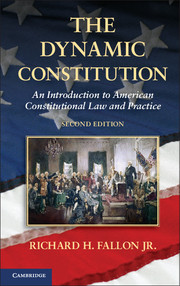Book contents
- Frontmatter
- Contents
- Preface to the Second Edition
- Preface to the First Edition
- Prologue: The Affordable Care Act and Other Vignettes
- Introduction
- Part I Individual Rights under the Constitution
- Part II The Constitutional Separation of Powers
- 7 The Powers of Congress
- 8 Executive Power
- 9 Judicial Power
- Part III Further Issues of Constitutional Structure and Individual Rights
- Appendix: The Constitution of the United States
- References
9 - Judicial Power
Published online by Cambridge University Press: 05 May 2013
- Frontmatter
- Contents
- Preface to the Second Edition
- Preface to the First Edition
- Prologue: The Affordable Care Act and Other Vignettes
- Introduction
- Part I Individual Rights under the Constitution
- Part II The Constitutional Separation of Powers
- 7 The Powers of Congress
- 8 Executive Power
- 9 Judicial Power
- Part III Further Issues of Constitutional Structure and Individual Rights
- Appendix: The Constitution of the United States
- References
Summary
[T]he judiciary, from the nature of its functions, will always be the least dangerous [branch of government].…It may truly be said to have neither force nor will, but merely judgment.
– The Federalist No. 78The Imperial Judiciary lives.
– Justice Antonin Scalia, protesting a Supreme Court decision upholding abortion rightsIN 1973, DURING A CONGRESSIONAL INVESTIGATION INTO abuses of power by the presidential administration of Richard Nixon and illegal activities by the Nixon reelection campaign, it came to light that Nixon had secretly recorded a large number of conversations in the Oval Office. The special prosecutor charged with investigating wrongdoing by administration and campaign officials demanded access to the tapes. When Nixon refused, the special prosecutor sought a court order directing Nixon to hand them over.
Whatever his personal motivations, Nixon had a serious constitutional argument that the tapes were protected by “executive privilege” – a prerogative of the President, as head of the Executive Branch, to protect papers, tapes, and other evidence of what his advisers had said to him and he to them in the course of making presidential decisions. According to Nixon, it would harm the presidency, and thus the country, if Presidents could not receive advice and probe policy options on an absolutely confidential basis. Nixon, of course, acknowledged that Presidents could disclose any information that they saw fit.
- Type
- Chapter
- Information
- The Dynamic ConstitutionAn Introduction to American Constitutional Law and Practice, pp. 275 - 298Publisher: Cambridge University PressPrint publication year: 2013



